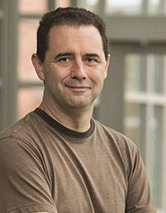 The Path to (Human) Perception Engineering
The Path to (Human) Perception Engineering
ABSTRACT
Enabled by a confluence of recent technologies, we are on the verge of dramatically reshaping the way people experience life by directly stimulating or disrupting their sensory systems. This leads to the engineering of targeted perceptual experiences. For example, a robotic telepresence system that leverages current display, tracking, and imaging technologies would enable people with limited mobility to explore the world and interact with more people. This talk will briefly overview points of curiosity along my career trajectory, from motion planning to sensor and filtering, to virtual reality. This will take us to my current vision, which is that a new field is emerging in which human perceptual experiences are engineered through wearable displays, sensing systems, and robots. Call it perception engineering. As it stands now, contributors to this subject are widely distributed across engineering fields such as computer graphics, VR/AR, HCI/HRI, mobile robotics, computer vision, machine learning, MEMS, optical engineering, nanophotonics, and acoustics. Even more importantly, the most critical knowledge comes from perceptual psychology and neuroscience, which need to be adapted from the science of perception to the engineering of perception. This leads to unique challenges, including finding the correct engineering criteria for effectiveness and comfort, understanding the adaptation of sensory and perceptual systems, and designing new interfaces that exploit learnable motor programs.
BIOGRAPHY
Steven M. LaValle is Professor of Computer Science and Engineering, in particular Robotics and Virtual Reality, at the University of Oulu, Finland. From 2001 to 2018, he was a professor in the Department of Computer Science at the University of Illinois. He has also held positions at Stanford University and Iowa State University. His research interests include robotics, virtual reality, sensor fusion, planning algorithms, computational geometry, and control theory. In research, he is mostly known for his introduction of the Rapidly exploring Random Tree (RRT) algorithm, which is widely used in robotics and other engineering fields. He also authored the books Planning Algorithms, Sensing and Filtering, and Virtual Reality.
and Virtual Reality, at the University of Oulu, Finland. From 2001 to 2018, he was a professor in the Department of Computer Science at the University of Illinois. He has also held positions at Stanford University and Iowa State University. His research interests include robotics, virtual reality, sensor fusion, planning algorithms, computational geometry, and control theory. In research, he is mostly known for his introduction of the Rapidly exploring Random Tree (RRT) algorithm, which is widely used in robotics and other engineering fields. He also authored the books Planning Algorithms, Sensing and Filtering, and Virtual Reality.
With regard to industry, he was an early founder and chief scientist of Oculus VR, acquired by Facebook for $3 billion in 2014, where he developed patented tracking technology for consumer virtual reality and led a team of perceptual psychologists to provide principled approaches to virtual reality system calibration, health and safety, and the design of comfortable user experiences. From 2016 to 2017, he was a Vice President and Chief Scientist of VR/AR/MR at Huawei Technologies, where he was a leader in mobile product development on a global scale.

